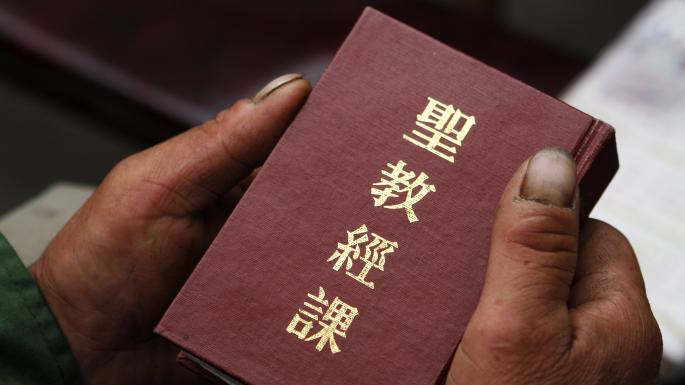CHINA
Bible sales banned online and in bookshops
Just as China pledged to uphold religious freedom, the country’s 70 million Christians are finding it harder to get a copy of the Bible. On Holy Saturday, China’s communist government issued a ban on internet sales of the Bible, which can no longer be sold online or in large bookstores.
Staff at one of Beijing’s biggest bookstores said they no longer sell the book. A staff member at the Wangfujing store said that the bible had been removed from sale for some time but she did not know why. A publishing house source said that Christian bookstores were subjected to regular inspections by the Ministry of Culture and that during one such visit by officials last week, an outlet in Beijing was told it could no longer sell “foreign” books.
Online bookstores in China have also pulled the Bible off their shelves. Searches for the Bible in Chinese on major e-commerce sites including Alibaba’s Taobao, JD.com, and Amazon China yield no results. The websites of the huge Xinhua Book Stores in Beijing’s Wangfujing and Xidan shopping districts also showed that there were no bibles for sale. The Quran is still available on Taobao, Amazon China, and another online retailer Dangdang, but not on JD.com. The four companies didn’t reply immediately to media requests for comment.
A notice issued on Twitter-like Chinese site Weibo banned online bookstores, such as Taobao and Dangdang, China’s equivalents of Amazon, from selling Bibles. People searching for Bibles on these sites were greeted with the message: “Sorry! No products in this category available.”
Chinese Christians in China have complained about social media that people are being prohibited from buying the bible online. A Beijing resident, who asked not to be identified, said that she bought a copy of the Bible on a bookstore on Taobao about a year ago, but that the book was no longer available on the site. When contacted by Quartz, the shop owner said the removal was forced by Taobao, which didn’t give a reason. Chinese internet users reported similar cases on microblogging site Weibo and Twitter, with some posting screenshots of their chats with bookshop owners who also said they were forced to take the Bible off their shelves.
A Catholic from Zhejiang province, who asked to remain anonymous, said that he and his church members had bought copies of the Bible from Chinese shopping sites such as Taobao in past years, but that they now have to smuggle them in from Hong Kong. “Now our country is extremely strict about religious control, and you can’t buy [the Bible] online,” he said.
Authorities have only confirmed that warnings have been issued to some online retailers. The Global Times said regulators “held talks” with JD.com “about selling illegal products, publications and other printed materials online.” Regulators said the company “had failed to regulate products and so caused a negative social impact.”
While the Bible has long been categorised in China as a publication “for internal distribution” – meaning that, officially at least, it can be sold only by government-sanctioned bodies that oversee Christian churches – the authorities have tended to look the other way. One observer noted that “It can only be sold in churches that the government permits — it looks like the government has started to take the matter seriously.” There is a long-standing rule that the Bible cannot be sold publicly or on the internet in China but the ban “was not enforced strictly before,” said Ying Fuk-Tsang, director of the Divinity School of Chung Chi College at the Chinese University of Hong Kong.
William Nee, a researcher for Amnesty International, said that the Chinese government should immediately reverse its ban on the sale of Bibles and ensure that all Christians and people of other religions can exercise their faith without government interference or intimidation.
“For a government that just yesterday claimed to be supporting religious freedom, it is ridiculous that the core book of a major world religion — the Bible — cannot be found on the major Chinese e-commerce platforms,” he said.
The ban on Bible sales comes amid tensions between China and Rome over negotiations regarding a historic agreement on the appointment of bishops that some observers believe is close to being signed. The ban also came, only a week after Bishop Vincent Guo Xijin of Mindong away from his diocese for a few days during Holy Week. The same thing happened to Xijin last year when he was held for 20 days.
White paper on Religious Freedom
Four days after banning Bible sales, the Chinese government pledged to continue to protect religious freedom in a white paper on religious freedom – the first issued on the subject in 21 years. However, the document released by the State Council described party authority over religion as being necessary for China’s independence and called on religions to adapt to a socialist society. It claimed that “western” religions such as Christianity “had long been controlled and utilized by colonialists and imperialists.” It also emphasized that Muslim leaders in China must keep their followers clear of extremist views.
The white paper notes that the number of people who practised religion at 200 million, double the 100 million in the previous paper published in 1997. It claimed 6 million are Catholics, 38 million Protestants and 20 million Muslims. However, other figures released in recent years suggest the Chinese government is underplaying religion numbers by excluding potentially tens of millions of people practising all denominations of Christianity outside the official state-run “churches.”





